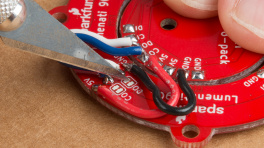Hardware Overview
Overall Features:
- Operating Voltage 3.3V
- Detecting Angle: 80 degrees
- Sensor range: 2cm to 400cm
- MCU on board: STM8L051F3
- 7 bit Unshifted Address: 0x2F
- Dimensions: 1.75" x 0.85"
STM8L051F3 MCU
The 8-bit ultra-low power STM8 MCU Core provides increased processing power (up to 16 MIPS at 16 MHz) while maintaining the advantages of a CISC architecture with improved code density, a 24-bit linear addressing space and an optimized architecture for low power operations. It also features embedded data EEPROM and low power, low-voltage, single-supply program Flash memory. The device incorporates an extensive range of enhanced I/Os and peripherals, a 12-bit ADC, a real-time clock, two 16-bit timers, one 8-bit timer, as well as standard communication interfaces such as an SPI, an I2C interface, and one USART. For more information, refer to the datasheet.
STM8L051F3 MCU
TCT40-16R/T
The TCT40-16R and TCT40-16T are an analog ultrasonic receiver and transmitter featuring a distance range from 2cm to 400cm meters and a beam angle of 80°. We've attached an RS232 transceiver to the transmitter to boost the signal being sent out, and the receiver goes through an LMV324 op-amp to clean up the signal coming in for optimum detection. For more information, refer to the translated datasheet here.
TCT40-16R/T
Qwiic connectors
Our Qwiic Ecosystem makes sensors pretty much plug and play. There are two Qwiic connectors on the side of the Qwiic Distance Sensor board to provide power and I2C connectivity simultaneously. The default I2C address is 0x2F. The updateAddress() function allows you to change the I2C address to any address from 0x08 to 0x7F. More information on our Qwiic Ecosystem can be found here.
Qwiic connectors
Power
Ideally, power will be supplied via the Qwiic connectors on either side of the board. Alternatively, power can be supplied through the pins along the bottom side of the board labeled 3V3 and GND. The input voltage range should be between 1.8-3.6V.
Power Pins
Trigger and Echo Pins
The Trigger and Echo pins are available as plated through holes to manually calculate the distance using the Ultrasonic Distance Sensor. To use, pull TRIG HIGH and then LOW, wait for the ECHO pin to go HIGH and then take the time in between to calculate the distance to the object. For more information on how this works, check out Example 3 in the Arduino Library.
Trigger and Echo Pins
Testpoint Pads
We've provided a number of open pads on the back of the board:
I2C Pads
Should you wish to avoid using the Qwiic connectors, you can use these two pads (along with the power PTH pins) to still take advantage of the I2C communication protocols.
I2C Testpoint Pads
Single Wire Interface Module (SWIM)
SWIM, INT, and NRST are all part of the "Single Wire Interface Module (SWIM)" used for programming the onboard STM8 microcontroller and for most users, can be effectively ignored. For those who wish to dive into the deep end and tweak the firmware, these pads are available. Requirements include ST Visual Develop (the ST Progamming Software bundled with Visual Develop), a COSMIC compiler license, and a USB to SWIM adapter.
SWIM Testpoint Pads
ADDR_RST
ADDR_RST resets the address to 0x2F.
ADDR_RST Testpoint Pad
Jumpers
Never modified a jumper before?
Check out our Jumper Pads and PCB Traces tutorial for a quick introduction!
LED Jumper
If you are concerned about power consumption, need to run dark, or you just don't like LEDs, cut the traces here to disconnect the Power LED from, you guessed it, power.
LED Jumper
I2C
The Qwiic Ultrasonic Distance Sensor has built-in 2.2k pull-up resistors on the SDA and SCL lines. These are needed for normal I2C communication. The I2C jumper has two small traces connecting the pull-ups to 3.3V. For general use you can leave this jumper unmodified. If you have many (over 7) devices on the I2C bus, each with their own pull up resistors, then you may want to cut the I2C jumpers to disconnect the 2.2k resistors on each Qwiic board.
I2C jumper
Board Dimensions
The board dimensions are illustrated in the drawing below; the listed measurements are in inches.
SparkFun Ultrasonic Sensor Board Dimensions
Need more measurements?
For more information about the board's dimensions, users can download the Eagle files. These files can be opened in Eagle and additional measurements can be made with the dimensions tool.
Eagle - Free Download!
Eagle is a CAD program for electronics that is free to use for hobbyists and students. However, it does require an account registration to utilize the software.
 Dimensions Tool
Dimensions Tool
This video from Autodesk demonstrates how to utilize the dimensions tool in Eagle, to include additional measurements:











